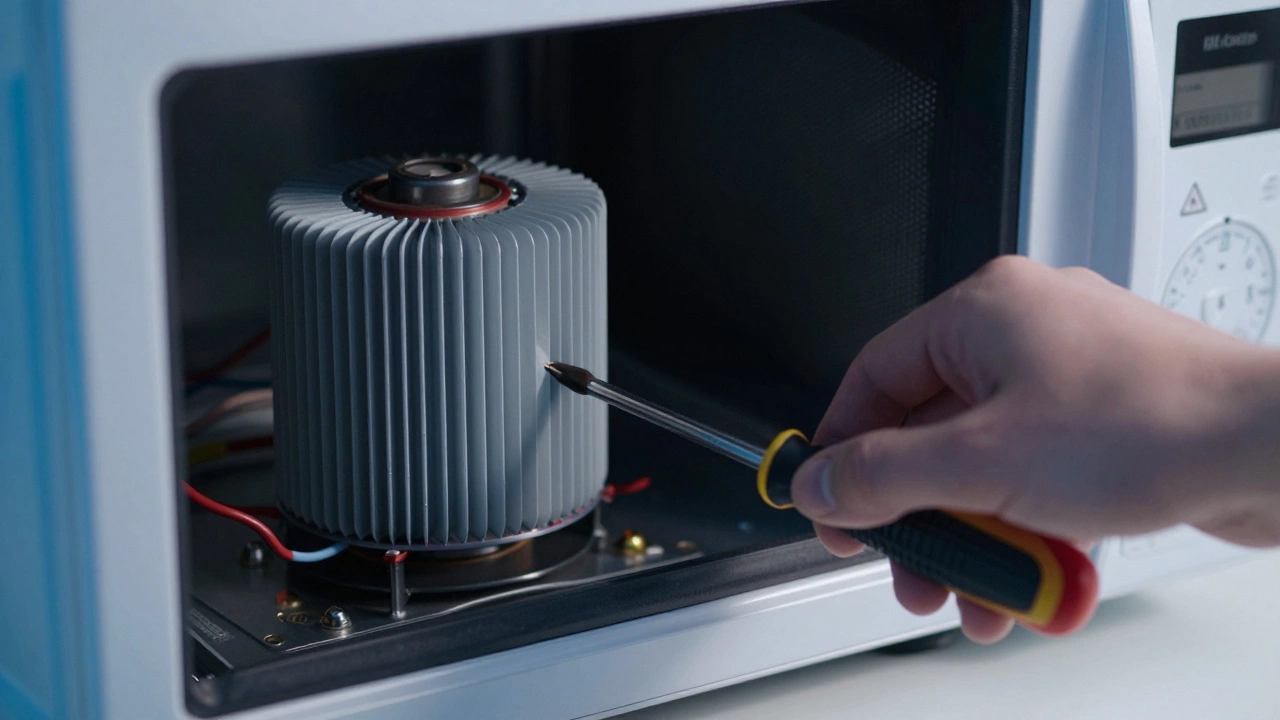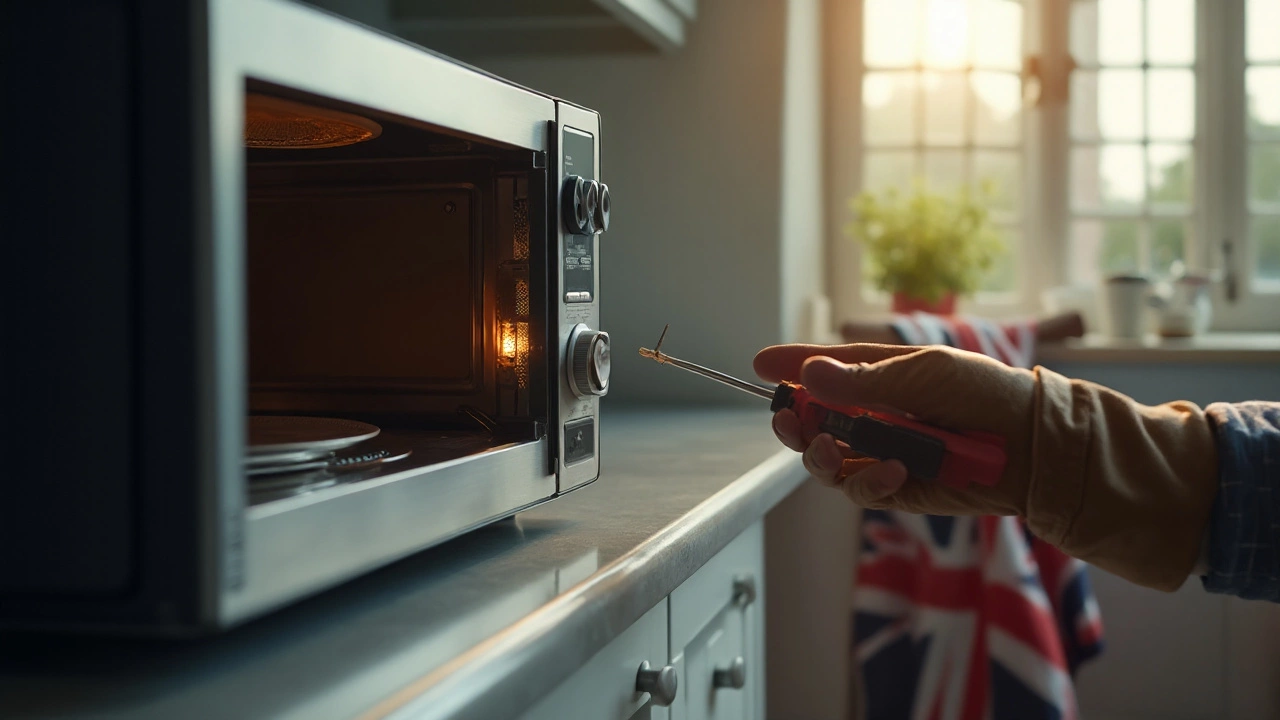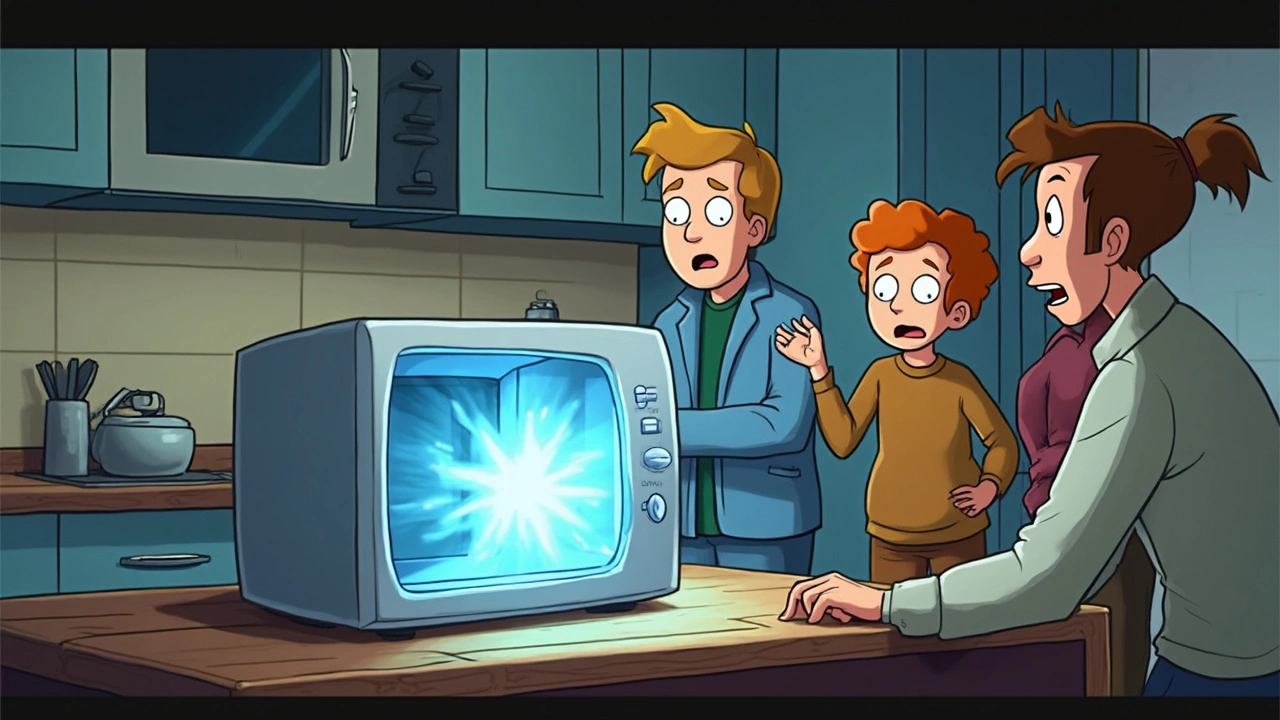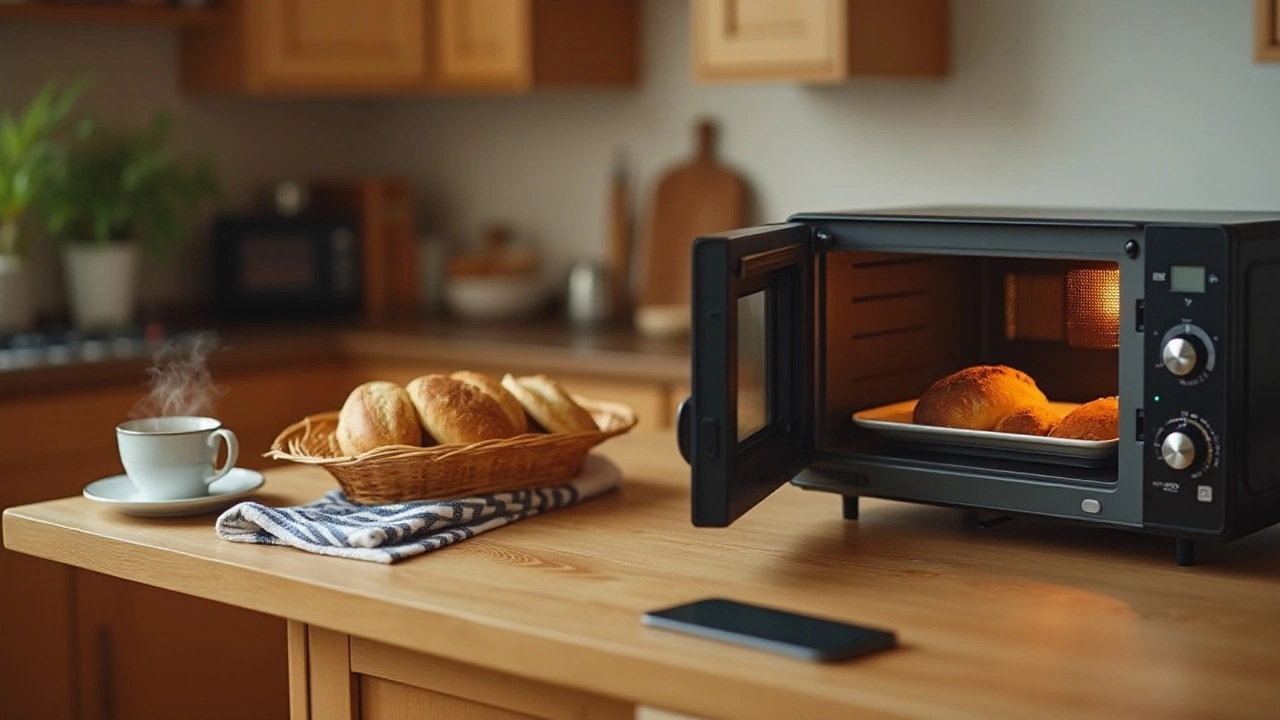Your microwave stops heating, makes weird noises, or just won’t turn on? It’s frustrating, but most issues are easy to spot. In the next few minutes you’ll learn the most common faults, safe DIY steps, and exactly when to pick up the phone for a qualified technician.
Microwave won’t heat. The first thing to check is the door latch. If the latch isn’t fully engaged, the unit will refuse to run for safety reasons. Open the door, press it shut firmly, and listen for the click. If the latch feels loose or broken, replace the latch kit – a job most DIYers can finish in under an hour.
Next, look at the turntable motor. A stuck motor will stop the plate from spinning, and some microwaves will shut off heating when the motor is jammed. Remove the turntable, clean any food debris, and rotate the motor shaft by hand. If it feels gritty, a few drops of kitchen oil can free it up. If the motor still won’t turn, the motor may need replacement.
Weird noises or sparks. Sparks usually mean a metal object was placed inside or the waveguide cover is dirty. Unplug the microwave, wipe the interior with a damp cloth, and inspect the waveguide cover (the small metal panel above the cavity). If it’s covered in carbon build‑up, gently clean it with a mild abrasive pad. Never use metal utensils inside a microwave – they’re the main cause of sparking.
Microwave displays error codes. Most modern microwaves show a code like “F4” or “E1”. Look up the code in the user manual; it often points to a specific sensor or control board issue. If the manual isn’t handy, a quick web search of the model plus the code usually brings up the fix. Simple resets (unplug for 2 minutes, then plug back in) solve many sensor glitches.
Lastly, check the fuse. Overloaded microwaves can blow the internal fuse, leaving the unit dead. The fuse is a small glass tube near the power cord. Replace it with the exact same rating – never guess a higher amperage, as that creates a fire risk.
If you’ve tried the latch, motor, waveguide, and fuse checks and the microwave still won’t work, it’s time to call a pro. High‑voltage components like the magnetron, capacitor, or high‑voltage transformer can store dangerous charges even when unplugged. Only a qualified technician should handle those parts.
Signs you need a professional include a burnt smell, visible scorch marks, or intermittent power loss. These symptoms often mean the magnetron is failing – a part that’s expensive to replace and requires special tools.
Another red flag is a microwave that cycles on and off quickly. This can indicate a faulty control board or a problem with the power supply. Trying to repair these yourself can void warranties and cause further damage.
Even if the repair cost seems high, compare it to buying a new microwave. A mid‑range unit costs around £100‑£150, while a professional repair for a magnetron usually runs £120‑£180. Weigh the age of your current microwave; if it’s more than ten years old, replacement may be the smarter choice.When you contact a repair service, ask if they are certified for high‑voltage appliances and if they offer a warranty on the work. A reputable local business will give a clear estimate and explain what parts need replacing.
In short, most everyday microwave hiccups are fixable with a few simple steps. Save time and money by checking the door latch, motor, waveguide, and fuse first. If the problem persists or involves high‑voltage parts, trust a qualified technician to keep you safe and your kitchen running smoothly.

Fixing your own microwave might seem easy, but the high-voltage capacitor inside can deliver a lethal shock-even when unplugged. Here's why DIY repairs are dangerous and what you should do instead.

Learn fast how to spot a blown microwave fuse, test it safely, and replace it yourself. Step‑by‑step instructions, tools needed, and common pitfalls covered.

Microwave suddenly dead? It might be the fuse. This article breaks down the real cost of repairing a microwave fuse—parts, labor, hidden fees, and whether you should DIY. You'll get practical tips on when to call a pro, what brands cost more, and how to avoid common mistakes. A straightforward guide to help you fix your microwave without overspending.

Microwaves seem invincible until they suddenly stop working—usually right when you're hungry. This article tackles what actually breaks down most often in a microwave, from simple blown fuses to tricky magnetrons. You'll learn the telltale signs for each failure, why these things wear out, and how to figure out if it’s something you can fix yourself. Plus, there are practical tips on keeping your microwave running smoother for longer. Perfect for anyone tired of cold leftovers and expensive repair bills.

Wondering if you can fix your microwave at home instead of tossing it and buying a new one? This article breaks down common microwave problems, what you can safely handle, and when it's better to call a pro. Get practical tips that actually make a difference, plus real talk about microwave safety. Save yourself time, money, and stress with easy-to-follow advice. Tackling your appliance repair just got a whole lot simpler.

When your microwave starts making strange noises or fails to heat your food, it might be time to think about the magnetron. It's like the heart of your microwave, but is it worth the trouble to replace it or should you just buy a new one? This article explores the costs, benefits, and the nitty-gritty of magnetron replacement, throwing in some pro tips to help you make the right decision.

Figuring out if your microwave is on its last legs can save you a lot of hassle. There are various signs that might indicate it's time for a fix or a replacement. Understanding these symptoms can help maintain your kitchen's efficiency. Here’s what you need to watch for: strange noises, inconsistent heating, and more. Catch these early, and you might avoid a total breakdown.

Microwaves are essential in modern kitchens, but when they break down, deciding whether to repair or replace them can be tricky. This article explores the factors that influence repair decisions, common microwave issues, and when it's more economical to buy a new one. It also offers tips on maintaining your microwave to prevent future problems. Understand the costs involved and make an informed choice on your kitchen appliances.

Microwave ovens are essential appliances due to their convenience in heating food. However, they can encounter several problems over time. The most frequent cause of microwave failure is a faulty door switch. This article discusses common microwave problems, how to identify them, and offers practical guidance on how to handle these issues.

Microwave ovens, essential kitchen appliances for many households, can sometimes fail to operate smoothly. This article dives into the intricacies of microwave repair, exploring common issues, troubleshooting methods, and practical repair tips. Designed for both amateur DIY enthusiasts and curious individuals, the guide offers insights into understanding microwave components and determining when professional help is necessary. Learn the skills needed to fix minor problems and tips to maintain the efficiency of your microwave.

When it comes to microwaves, understanding their lifespan is crucial for homeowners looking to make informed decisions about maintenance and replacement. This article delves into the essential factors that affect the longevity of microwaves, offering practical tips on extending their lifespan and recognizing when it's time for a new one. You'll learn about common signs of wear and tear, the importance of proper usage, and how regular servicing can enhance performance. Discover how to keep your microwave running efficiently and what to do when repairs are inevitable.

Microwave suddenly dead? It might be the fuse. This article breaks down the real cost of repairing a microwave fuse—parts, labor, hidden fees, and whether you should DIY. You'll get practical tips on when to call a pro, what brands cost more, and how to avoid common mistakes. A straightforward guide to help you fix your microwave without overspending.

Why would a freezer suddenly stop working? This article uncovers the most common reasons, from electrical hiccups to sneaky broken parts. Get clear tips to troubleshoot on your own before calling in the pros. You'll also find surprising facts—like a forgotten coin trick to check freezing power. Whether it's food loss or a mystery beep, you'll get straight answers and a path to a cold fix.

Understanding whether an electrician can repair your extractor fan might save you time and hassle. Dive into the nitty-gritty of what electricians can do for your fan problems, and get tips on how to maintain these helpful appliances. This guide covers the skills electricians bring to the table and when a specialist might be needed. Stay informed and prepared for any fan-related issues that might come your way.

Fridge warm but the light works? Find out why your refrigerator isn’t cooling, common causes, fixes, and when to call in an expert. Easy troubleshooting tips inside.